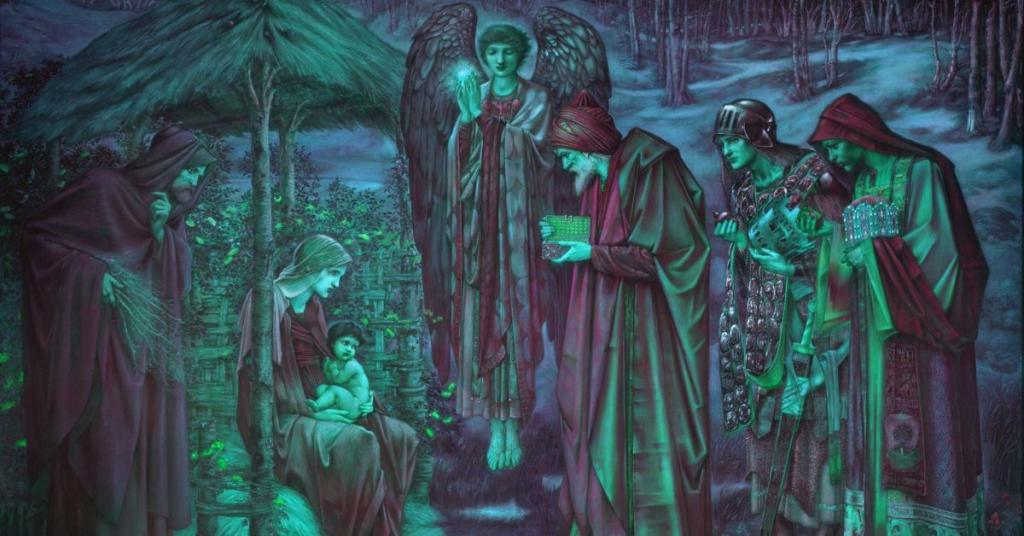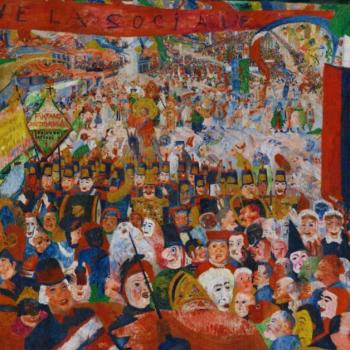
Well, it’s that time of year—Christmas!
And in the theological world that only means one thing—vying hard for ‘your positions’ on the birth of Christ. Tis the season for a conversation on Jesus at Christmas.
It never fails. It also never fails to produce never-ending eye rolls from yours truly.
You can hop onto any Christian blogging site and find arguments for and against the virgin birth, the exact dates or lack thereof when Jesus was born, if wisemen or kings were present, if a north star could be seen, and the boring list of historical question marks goes on and on.
If you’ve read any of my books or if you have hung around this space long enough you will undoubtedly know that these are the sorts of theological conversations I don’t appreciate in the least. Mostly because they aren’t actually theological and get to the heart of nothing. When people are adamant about the facticity of certain elements in the gospel accounts we find that those who might have taken such elements in their stride are now potentially being tossed by them. Maybe wondering what’s the point if these pieces aren’t real, or haven’t happened the way they were told they did.
Telling someone Mary ‘for sure wasn’t a virgin’ but ‘go ahead and believe and find meaning in the story anyway’ is an absolutely ridiculous and idiotic thing to say. It is a circle that goes nowhere and inspires nothing. I have zero time for these conversations. And in the end most of the conversations are a matter of hubris than anything else and while I’m pretty sick of it I suspect they unfortunately aren’t going anywhere.
There are powerful and transformative reasons for which we are told Mary was a virgin when becoming impregnated with her son, Jesus. There are beautiful theological grounds for who we are told was present at his birth. There are radical and subversive underpinnings for his birth at all. These are the matters we need to delve into and should be passionately concerned with. Understanding some of the roots of this stuff is what will ultimately foster a metamorphosis and conversion of the most peculiar kind. The sort that is life long and never-ending. This is what we are after when it comes to Jesus—his birth, his life, his death. And the other stuff is just muck that muddies the waters of the search unnecessarily and detrimentally.
As someone who has long identified as a Christian and post-Christian thinker and writer the most important part of the work has been the exploration into Christ and why he still matters. For me, this is of paramount importance otherwise why invite the word ‘Christian’ into the conversation at all? Why not just call ourselves humanitarians if we want to love people and work towards justice or agnostics if we are happy to settle on mystery?
Now if you haven’t read my two chapters on Jesus in my book Safer than the Known Way and my several essays on Jesus in my book Reconfiguring I would encourage you to because I have spent a significant amount time thinking through some of this stuff in dialog with great thinkers and theologians. And if you are struggling with the idea of Christ I think some of what I have written can be helpful for you. But for now let me say this…
If we don’t wrestle with the full spectrum reality of Christ then what are we doing here? And by full spectrum I mean his whole reality. Not just the parts we think are empirically believable or the parts that make sense but in the words of my best friend and favorite thinker, Barry Taylor, “the imperceptible reality of the cross and our hope for meaning anyway.” Faith doesn’t ask us to defy belief, it asks us to have faith that the search is worth it and it asks us to stick around within that search for life. When we go after one-dimensional realities we bypass and even kill the meaning hidden within the folds of what some call the greatest story ever told.
As Kenneth E. Bailey writes, “The texts related to the Christmas story are familiar to Christians, but to the diligent student they yield fresh understanding.” What if as we return to the Christmas narratives of the birth of Christ again and again they infuse us with inspiration and invigoration to keep on with our search and dare I say salvation*? When taking a closer look at the promise of what it might have meant to be saved, as the very name of Jesus promises (Yesua—yasa=to save), we find it is about freedom; freedom that has been taken and held captive by the oppressor. Bailey says, “The concept of sin is shaped by what people are enduring from their oppressors, and the word salvation is used to express their longing to be free from that oppression. For such a community there is little space in the mind to tolerate anyone talking about its sins and need for salvation from those sins.”
So already we find that we are invited into something much bigger than some potential dark spot on our soul precluding us from some promised after life. We are asked to join in this project of freedom from real and tangible manifestations of evil in our world, not only from the evil that would seek to terrorize us but others as well. It isn’t a passive invite. We are petitioned to be active participants. It is how we honor all that has been given to us and all we have been charged with.
Likewise, Jesus got himself persecuted and ultimately killed for calling out sin within the community of the oppressed. Telling them that they’ve actually got bigger problems than the Romans and it’s themselves. They’re the problem. As Bailey points out, “It takes a brave man or woman to tell the community that it needs salvation from its sins.”
As a society and individuals we are somehow asked to call out the sins of the oppressors but also to call out the sins of the oppressed. The log in our own eye, as opposed to the speck in others. And it isn’t what we consume that defiles but what comes out that does so. The onus is on the individual yet the individual seeks such a salvation ultimately for the betterment of the community of oneness or what was intended as unity as oneness. If there is salvation to be had it is wrapped up in the freedom of the community and a community can only be free if its individuals are also liberated.
Have I described a utopian vision? Something utterly impossible?
Some might say.
But all I have done is engage the opening lines of each gospel story, including Mark and John’s which don’t even include a birth narrative but are deeply powerful and theological all the same.
In Daniel Izuzquiza’s Rooted in Jesus Christ: Toward a Radical Ecclesiology, when talking about the “need to develop a radical theology” he describes it as “one centered on the lived experience of the church. The Christian community, firming rooted in Jesus Christ, proposes a radical alternative to the system that now dominates out world.”
He opens with talking about this word radical. “Radical comes from the Latin word radix, which means ‘root.’” What does it mean to get down to the root of Christ? What does it mean to be rooted and ground in Christ as Ephesians 3 implores us to be?
These are the questions we must grapple with if we are to engage our Christianity, whether we are post or otherwise, in any real way. If it were an easy answer I would write it down for you right here, right now. But as I said earlier, the answer, I believe, lies in the pursuit of the answer. And that is a life long endeavor.
For me, it is all worth the price of admission. And speaking of admission, back to the Christmas story. So much starting with so little. And so much seemingly ending with so little on the cross. It all seems unthinkable. An intellectual conundrum, yet as Barry reminds us an “imperceptible reality” that asks us to make meaning in the face of it all. And I’m totally up for it. I think you are, too. Which is why you are reading this.
I hope you think again when someone throws the virgin birth in your face, or the time of year the birth of Jesus supposedly happened. Walk away, don’t take the bait, and set your sights on the deeper things; root things. A new conversation on Jesus at Christmas. A better one.
Wishing you the merriest of Christmases wherever you are in life, in the world, and in your faith. I know holidays can be tough for a myriad of reasons, not least of which theological and spiritual meaning. But know we are in this together as we search and seek, liberating and finding freedom together as we continue to pursue Jesus and all he meant and has yet to mean.
*If you are interested in receiving monthly content along these lines in both written and audio format please check out my patreon where you will find the audio accompaniment to this article. While I don’t usually overlap content I decided to share this article on both platforms.













